Discover the enigmatic life of Zillah, a biblical figure whose story unveils ancient marriage customs and women's roles.

Zillah in the Bible
Isn't it curious how you can skim through the Book of Genesis and stumble upon the name Zillah, almost as if by chance? You've probably noticed her mentioned briefly as Lamech's wife and Tubal-cain's mother, yet there's so much more beneath the surface.
Zillah's story, nestled within ancient texts, offers a unique lens through which to examine women's roles and marriage customs of her time. While her narrative might seem concise, the implications of her life and the societal norms it reveals invite you to explore further.
What secrets does Zillah's story hold about the world she lived in?
Key Takeaways
- Zillah is identified as Lamech's wife and the mother of Tubal-cain and Naamah in Genesis.
- Her story offers insights into early societal and familial dynamics.
- Zillah's mention highlights the roles of women in biblical narratives.
- The implications of her story prompt reflection on marriage customs and gender roles.
The Brief Mention of Zillah
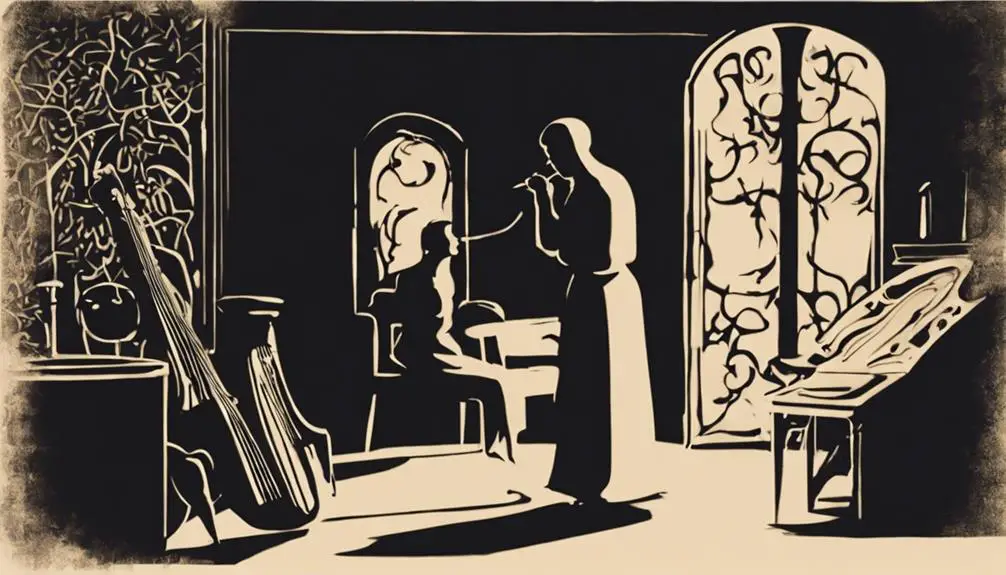
In the biblical narrative, Zillah is briefly mentioned as Lamech's wife and the mother of Tubal-cain and Naamah, underscoring her role within the genealogy of Genesis. This scant reference to Zillah, nestled in the pages of the Bible, might initially appear as a mere footnote in the vast tableau of biblical genealogies. However, Zillah's legacy, though subtly conveyed, holds significance beyond the brevity of her mention.
Zillah's presence in the biblical text, while minimal, invites a deeper exploration of the roles women played in the early narratives of the Bible. Her mention alongside Lamech, and as the mother of notable figures, situates her within a framework of familial importance that underpins many of the stories in Genesis. This positioning, though modest, contributes to the broader understanding of lineage and legacy within the biblical context.
The biblical mentions of Zillah, while sparse, serve as a testament to the narrative importance of even the less prominently featured individuals in the Bible. Through Zillah, scholars and readers alike are reminded of the nuanced layers of storytelling and historical preservation encapsulated within these ancient texts. Her brief appearance thus enriches the tapestry of Genesis, offering insights into the complexities of biblical genealogies.
Zillah's Family Connections
Exploring Zillah's family connections sheds light on her significant yet understated role within the intricate genealogical web of Genesis. As the wife of Lamech and the mother to Tubal-cain and Naamah, her position isn't merely a footnote but a critical node in understanding the broader cultural and familial dynamics at play. Zillah's genealogical significance extends beyond her immediate family; it delves into the early societal structures and the roles individuals occupied within them.
Her lineage, intertwined with pivotal figures, offers a lens through which to view the cultural context of her time. It suggests a society where familial ties dictated social standing and responsibilities, highlighting the importance of genealogical connections in establishing identity and influence. Zillah, though briefly mentioned, is thus a key figure in piecing together the social fabric of Genesis.
Her connections reveal the nuanced layers of relationships and the genealogical threads that weave the narrative of Genesis together. Through Zillah's lineage, we gain insight into the complexities of early human societies depicted in biblical texts, underscoring the importance of understanding these connections to fully appreciate the cultural and historical backdrop of the Bible.
Women's Roles in Genesis
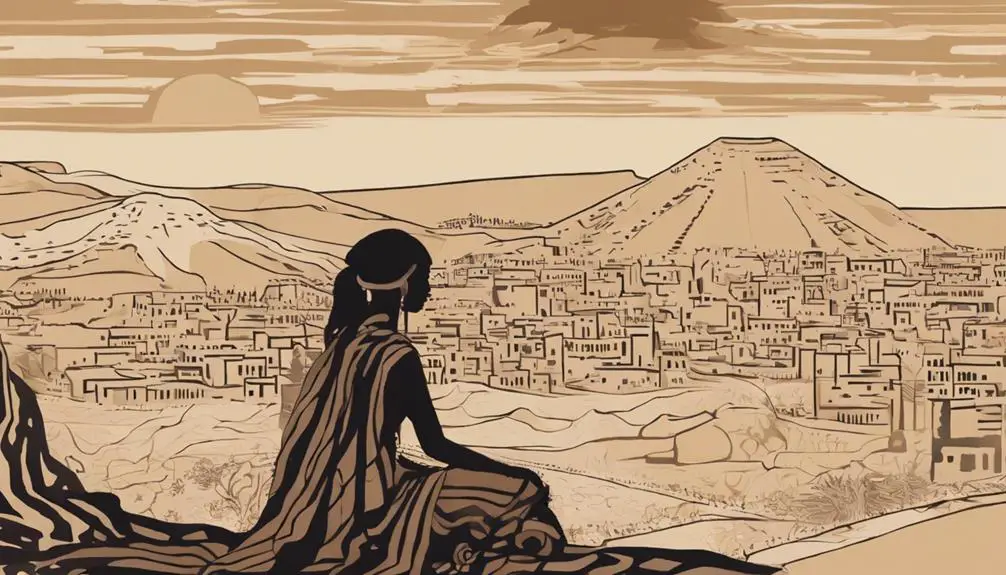
The depiction of women's roles in Genesis offers a nuanced view into the societal and familial dynamics of ancient times, revealing their significant yet often overlooked contributions to biblical narratives. While the text is primarily woven through patriarchal narratives, it's imperative to recognize the instances of female leadership and the subtle ways women navigated and influenced their surroundings within these constraints.
In Genesis, women often operate within the framework of a male-dominated society, yet they assert their agency in various forms. Their roles are multifaceted, encompassing not only their contributions as mothers and wives but also as leaders who make critical decisions impacting their families and, by extension, the course of biblical history. This highlights a complexity in their characters that mightn't be immediately apparent due to the overarching patriarchal context.
Moreover, the stories of women in Genesis serve as a testament to their resilience and adaptability. They negotiate their positions in a world that frequently sidelines their voices, finding ways to assert their influence, whether through direct action or more subtle means. This analysis underscores the importance of reevaluating female leadership within these ancient texts, challenging readers to look beyond traditional interpretations of patriarchal narratives.
Marriage Customs Explored
Marriage customs within biblical narratives reveal complex societal structures and personal dynamics, shaping the lives and destinies of individuals and families. As you delve into the ancient texts, you encounter a variety of practices that underscore the importance of marriage as both a personal union and a social contract.
Dowry practices were pivotal, serving not only as a bride's inheritance but also as a means of securing her financial future. Wedding ceremonies, often elaborate affairs, symbolized the merging of two families and were pivotal in establishing new social ties.
To highlight the multifaceted nature of these customs, consider:
- Dowries often included land, livestock, or valuable goods, emphasizing the economic aspect of marriages.
- Wedding ceremonies could last several days, underscoring the communal aspect of marriage.
- Marriages were frequently arranged by families, highlighting the strategic alliances formed through these unions.
- Virginity and fidelity were highly valued, reflecting the moral and ethical standards of the time.
These customs weren't just rituals; they were deeply embedded in the fabric of society, influencing everything from personal relationships to property rights. Through the lens of marriage, you gain insights into the broader societal values and norms that governed ancient life.
Implications of Zillah's Story
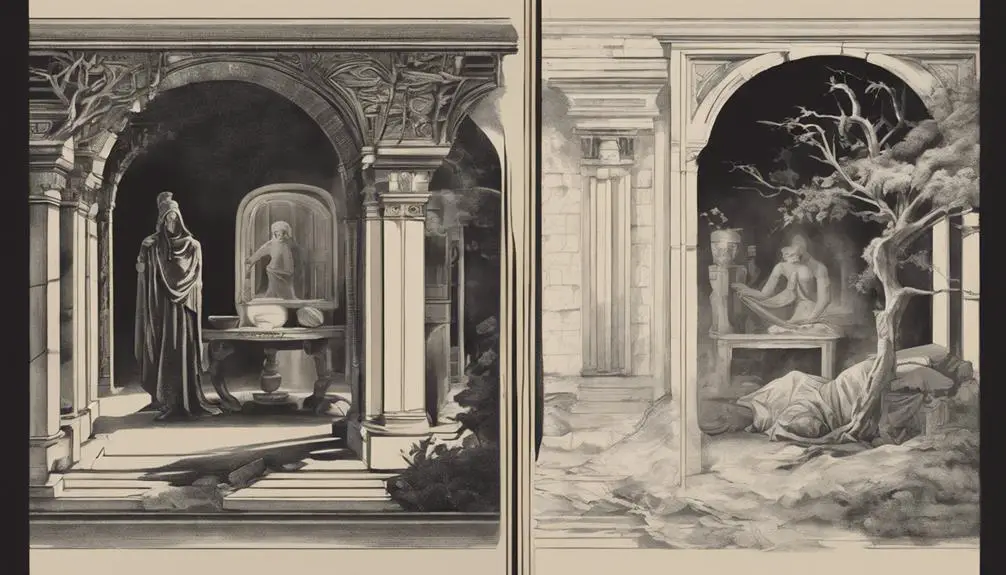
Reflecting on the marriage customs outlined previously, Zillah's story in the biblical narrative offers a compelling lens through which we can examine the nuanced implications of these practices on individual lives and societal structures. Her position as one of Lamech's wives illuminates the complexities of polygamous relationships and their broader societal impacts, inviting deeper analysis into how these customs influenced women's roles and societal dynamics in ancient times.
Symbolic interpretations of Zillah's story further enrich our understanding of these ancient practices. She represents more than just a figure in a narrative; her story is a window into the lived experiences of women and the societal norms that shaped their lives. Through Zillah, we're able to explore the intersections of personal agency, marital practices, and societal expectations. Her presence in the Bible, although brief, prompts critical reflection on the ways in which marriage customs can both reflect and reinforce societal values and hierarchies.
Understanding Zillah's story, therefore, isn't just an exercise in historical or biblical scholarship. It's a means to engage with the symbolic interpretations and societal impacts of ancient practices, offering insights that remain relevant in discussions about gender, marriage, and society today.
Frequently Asked Questions
What Archaeological Evidence Exists Supporting the Existence of Zillah or Her Contemporaries Mentioned in the Bible?
You're looking for archaeological evidence that supports the existence of figures similar to those in ancient texts. Ancient inscriptions and carbon dating play crucial roles in this quest. These methods have uncovered artifacts and remnants from periods aligning with those stories, providing tangible links to the past.
While direct evidence of specific individuals remains elusive, the techniques offer insights into the lives and times of people from those eras, sketching a broader historical context.
How Has Zillah's Story Influenced Modern Cultural or Artistic Expressions, Such as in Literature, Film, or Visual Arts?
You'll find that Zillah's symbolism has woven its way into modern adaptations across literature, film, and visual arts. These expressions often explore themes central to her story, reimagining her significance in contemporary contexts.
Are There Any Notable Differences in How Zillah's Story Is Interpreted or Emphasized in Different Religious Traditions or Denominations?
You'll find that interpretations of Zillah's lineage vary across religious traditions or denominations, shedding light on how different groups emphasize her story.
Naming conventions play a significant role, revealing insights into her character and legacy. These nuances reflect broader theological perspectives, where each tradition's focus might differ, highlighting or downplaying aspects of her narrative.
This analytical approach shows the complexity in understanding historical figures within religious texts, emphasizing scholarly examination.
What Psychological Insights or Theories Have Scholars Proposed Regarding Zillah's Motivations and Personality Based on Her Brief Mention in the Bible?
Exploring the scant details provided, scholars have dived into psychological speculation about her motivations and personality traits.
The focus on Zillah's silence fuels theories that suggest a complex individual, possibly navigating her surroundings with strategic reticence.
This analytical approach infers that her minimal presence in texts doesn't diminish the potential depth of her character, inviting a scholarly examination that spans beyond the surface to ponder what her silence might signify about her inner life.
How Do Contemporary Feminist Theologians View Zillah's Story, and What Significance Do They Attribute to Her in the Context of Biblical Narratives of Women?
Contemporary feminist theologians examine stories like yours through a lens that emphasizes gender dynamics and theological reinterpretation. They see your narrative as significantly contributing to the discussion on biblical women's roles, offering fresh insights into old texts.
Conclusion
In exploring Zillah's narrative, one can't help but draw parallels to the broader tapestry of Genesis, where women's roles and familial structures offer a reflection of ancient societal norms.
Zillah's story, though briefly mentioned, serves as a vital link in understanding the intricate web of marriage customs and gender dynamics of her time.
By examining her place within this context, you gain not just insight into her life, but also into the foundational narratives that have shaped human understanding of relationships and societal roles for millennia.

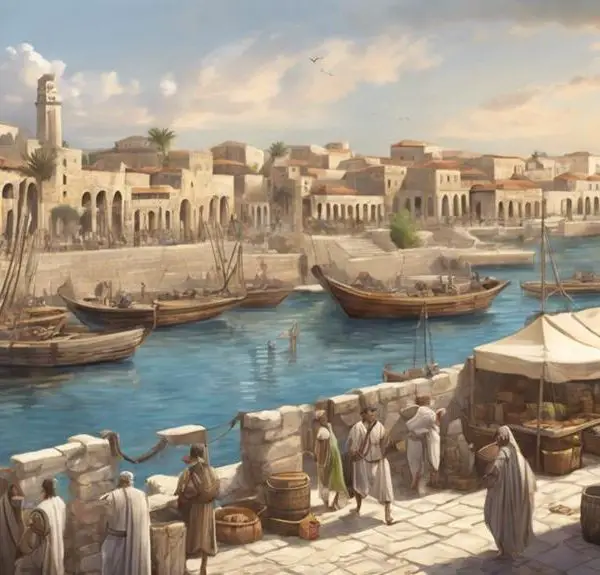
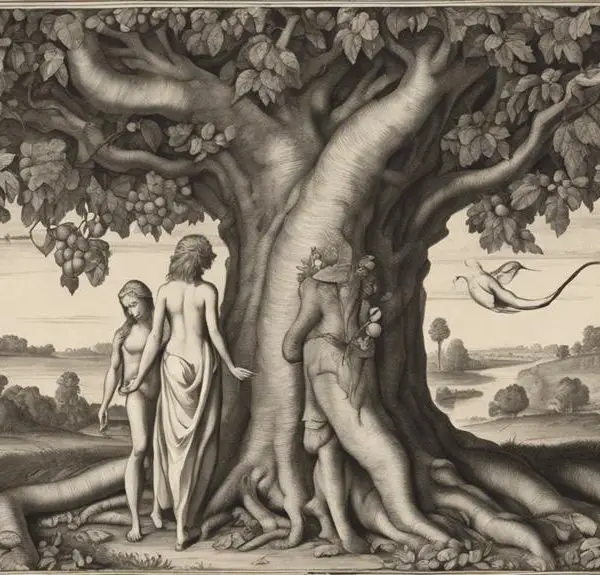
Sign up